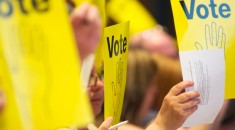- Conference
- 2015 National Women's Conference
- Date
- 16 October 2014
- Decision
- Carried
Conference notes that in May 2014, 28 member states of the European Union (EU) elected 751 Members of the European Parliament (MEPs) to represent their interests. These elected representatives have a 5 year term of office in which to advance any number of common policies and promote a Europe that celebrates all its diverse members whilst condemning any form of hate crime and inequality. The UK has 73 MEPs, of whom almost a third (32%) are women. This is significantly higher than the level at the Westminster Parliament (22%).
Conference further notes that over the next five years the European Parliament will play a central role in shaping EU policy for gender equality; against discrimination; on hate speech and hate crime; on free movement; on the rights of transgender people; on health; and on gender and other equality issues in the EU’s foreign policy.
Conference is concerned about the progression of far-right parties, parties propagating so-called ‘traditional’ or ‘family’ values (which are actually anti-women’s rights and anti-LGBT equality), xenophobic, bigoted and racist ideas. There are now 80 MEPs from these parties, threatening the core European values of human rights and equality.
However, although UKIP made great strides in the UK euro-elections, Labour and the Greens – both traditional allies of equality – made some significant gains on the Tories and Liberal Democrats. Across Europe the far right did not make the kinds of gains that were expected, for example Geert Wilders’ party did worse than predicted in the Netherlands. Further, France’s Marine Le Pen has not been able to form an intergroup of far right allies due to not meeting the requisite number of countries and representatives. This would indicate the far right groups are divided.
But conference notes we have no room for complacency. Many, including many women, want to see Europe broken up. Years of recession, soaring unemployment, and lacklustre leadership have left many women with little faith that the politicians can solve their problems. Worrying developments in the guise of the secretive Trans-Atlantic Trade Agreements (TTIP) threaten to disrupt and erode our employment policies and rights.
Conference believes that we cannot let apathy allow any erosion of our hard fought rights. We must exercise our right to influence and shape future policy by encouraging UNISON women to engage with the MEPs that we voted to represent us, and to engage with the future elections, including the forthcoming general election.
We must not forget what Europe has done for equality and for LGBT, anti-racist and women’s legal rights.
Conference calls on the national women’s committee to:
1)Work with UNISON’s International department to keep regional and branch groups up to date with campaigns to preserve rights threatened by faceless multinationals, such as the campaign against the Transatlantic Trade and Investment Partnership;
2)Consider training for women’s groups on political engagement and engaging with international solidarity campaigns;
3) Liaise with the other self organised group committees in meaningful dialogue around joint campaigns to prevent further erosion of our hard won equality rights;
4)Signpost regional groups to the ILGA-Europe website for the latest European anti hate crime campaigns.

